常见英语特殊结构
英语特殊结构
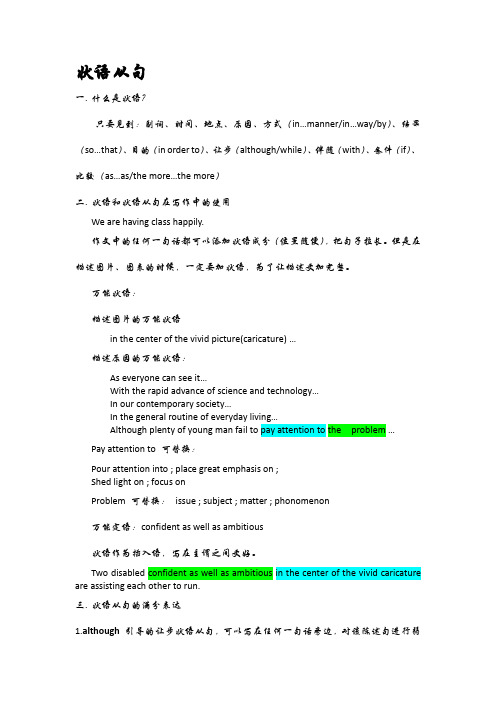
状语从句一.什么是状语?只要见到:副词、时间、地点、原因、方式(in…manner/in…way/by)、结果(so…that)、目的(in order to)、让步(although/while)、伴随(with)、条件(if)、比较(as…as/the more…the more)二.状语和状语从句在写作中的使用We are having class happily.作文中的任何一句话都可以添加状语成分(位置随便),把句子拉长。
但是在描述图片、图表的时候,一定要加状语,为了让描述更加完整。
万能状语:描述图片的万能状语in the center of the vivid picture(caricature) …描述原因的万能状语:As every one can see it…W ith the rapid advance of science and technology…I n our contemporary society…In the general routine of everyday living…Although plenty of young man fail to pay attention to the problem …Pay attention to 可替换:Pour attention into ; place great emphasis on ;Shed light on ; focus onProblem 可替换: issue ; subject ; matter ; phonomenon 万能定语:confident as well as ambitious状语作为插入语,写在主谓之间更好。
Two disabled confident as well as ambitious in the center of the vivid caricature are assisting each other to run.三.状语从句的满分表达1.although引导的让步状语从句,可以写在任何一句话旁边,对该陈述句进行弱转折。
英语的特殊句式

英语的特殊句式英语中有一些特殊的句式结构,以下是几个常见的特殊句型:强调句型 (Emphatic Structure)通常采用"It is/was + 强调部分 + that/who + 其他部分"的结构。
示例:It was in China that Tom first met Mr. Lin.It's not what he said but the way he said it that matters.否定词“not”与“until”的强调用法当用于时间状语从句时,"not until"位于句首构成倒装结构以强调时间点。
正常句:He didn't go back home until midnight.强调句:It was not until midnight that he went back home.疑问形式的强调句特殊疑问词(如what, when, where等)+ be动词 + it + that + 其他部分示例变问句:Where was it that you got to know her?省略形式在口语或非正式书面语中,强调句中的"that"有时可以被省略,但不影响理解其为强调句。
如:They couldn't say what it was that troubled them.定语从句的强调强调定语从句的内容时,也可以使用强调句型。
示例:It's not who is right but what is right that is of importance.被动语态强调被动语态中也可用来强调动作的承受者。
示例:It is this book that is widely read by students.比较级句型的强调使用 "no...more than", "not so much...as" 等结构来强调比较对象的相对性。
英语句子特殊结构

英语句子特殊结构《英语句子特殊结构》英语句子中有一些特殊的结构,它们的用法和形式与普通的简单句或复合句有所不同。
这些特殊结构在英语中起着多种不同的作用,包括强调、倒装、省略等。
在本文中,我们将会介绍一些常见的特殊结构,以便更好地理解和运用它们。
1. 强调结构强调结构是用来强调某个部分或内容的一种句子结构。
常见的强调结构有两种形式:强调句和强调副词。
在强调句中,通常使用的是"It is/was...that"结构,其中的"it"是形式主语,真正的主语位于句子末尾。
例如:It is Mary who won the first prize.(是玛丽赢得了第一名。
)在强调副词中,通常使用的是"do/did/is/am+形容词/副词+that"结构。
例如:It was so difficult that I couldn't solve the problem.(那道题太难了,我没能解决。
)2. 倒装结构倒装在英语语法中是一种常见的特殊结构。
它的使用形式较多,包括完全倒装、部分倒装等。
完全倒装通常发生在助动词、情态动词和be动词等之前,例如:Had I known the truth, I would have acted differently.(如果我知道了真相,我会采取不同的行动的。
)部分倒装通常发生在否定词或数词之前,例如:Not only did she win the race, but she also broke the record.(她不仅赢得了比赛,还打破了纪录。
)3. 省略结构省略结构是指在句子中省略了某些成分,但由于上下文的关系,读者或听者可以理解省略的内容。
最常见的省略结构是主语的省略,例如:Run!(快点跑!)这种情况下,主语"I"被省略了,但仍然可以理解为"你"。
此外,还有其他的省略结构,例如:Can you play the guitar? Yes, I can.(你会弹吉他吗?是的,我会。
英语三中特殊结构
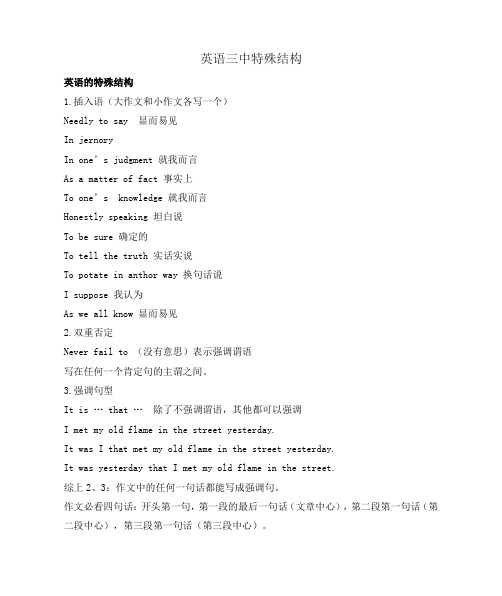
英语三中特殊结构英语的特殊结构1.插入语(大作文和小作文各写一个)Needly to say 显而易见In jernoryIn one’s judgment 就我而言As a matter of fact 事实上To one’s knowledge 就我而言Honestly speaking 坦白说To be sure 确定的To tell the truth 实话实说To potate in anthor way 换句话说I suppose 我认为As we all know 显而易见2.双重否定Never fail to (没有意思)表示强调谓语写在任何一个肯定句的主谓之间。
3.强调句型It is … that …除了不强调谓语,其他都可以强调I met my old flame in the street yesterday.It was I that met my old flame in the street yesterday.It was yesterday that I met my old flame in the street.综上2、3:作文中的任何一句话都能写成强调句。
作文必看四句话:开头第一句,第一段的最后一句话(文章中心),第二段第一句话(第二段中心),第三段第一句话(第三段中心)。
以上三个句型推荐写在必看的四句话中。
Confidence, to my knowledge, is claimed strikingly crucial.There exist a sea of elements to be responsible for my perspective.All in all, confidence never fails to plays a key role in our glories.4.修辞(1)比喻Sth proves to 人 as water is to fish.Sth proves to 人 as solid foundation is to high skyscapers.Sth proves to 人 as intensive pain is to incurably ill patients.。
英语特殊句式归纳整理

英语特殊句式归纳整理用来表示说话人强烈的喜、怒、哀、乐等感情的句子,叫感叹句。
感叹句由what或how 引导,具体用法如下表:祈使句的基本用法祈使句是用来表示命令、请求、建议或劝告等的句子。
常省略主语,谓语动词用原形。
1. 肯定的祈使句①句型:动词原形+其他成分。
Be careful!小心!②"Do+祈使句"表示一种强烈的感情或请求,do起强调作用。
③please用在祈使句中可以表示一种客气的语气,但please用在句末时,必须用逗号与其余部分隔开。
Close the door, please. 请关门。
2. 否定的祈使句①常用句型:Don’t+动词原形+其他成分。
Don’t be late for school again! 别再迟到了!②用Never开头:Never+动词原形+其他成分。
Never leave today’s work for tomorrow! 不要把今天的工作留到明天!3. Let引导的祈使句以Let开头的句子也是祈使句,表示陈述和建议。
其否定形式有两种:Let...not或Don’t...Let us not be late. 让我们不要迟到。
Don’t let the boy play football in the street. 不要让这个男孩在街上踢足球。
祈使句与简单句、复合句之间的转换1. "Let’s + 动词原形+ 其他"可转换为"Shall we + 动词原形+ 其他? "。
Let’s go fishing this afternoon. =Shall we go fishing this afternoon?2. "祈使句+ and/or + 简单句"可转换为含if引导的条件状语从句的复合句。
Use your head, and you’ll find a way. =If you use your head, you’ll find a way. Hurry up, or we’ll be late. =If we don’t hurry up, we’ll be late.祈使句的应答语1. 以Let’s开头的祈使句,其答语常用Good idea. /OK. /Yes, I’d love to.等。
英语特殊句型结构大全

英语特殊句型结构大全1. 否定句型结构(Negative sentence structure)主语 + 动词 + not + 宾语(或补语)例如:I do not like coffee. (我不喜欢咖啡。
)2. 疑问句型结构(Question sentence structure)(1)一般疑问句助动词(be、do、have等)+ 主语 + 其他?例如:Are you happy? (你开心吗?)(2)特殊疑问句疑问词(what、where、when、why、who等)+ 助动词(be、do、have等)+ 主语 + 其他?例如:What are you eating? (你在吃什么?)3. 倒装句型结构(Inverted sentence structure)(1)全部倒装助动词、be动词或情态动词 + 主语 + 谓语动词(不带to)+ 其他?例如:Never have I seen such a beautiful sunset. (我从未见过如此美丽的日落。
)(2)部分倒装表示否定的词(hardly、never、seldom、not等)+ 谓语动词 + 主语 + 其他?例如:Seldom do I have time to read novels. (我很少有时间读小说。
)4. 强调句型结构(Emphatic sentence structure)主语 + 动词 + bet/fact/matter + 疑问词/that + 句子其他部分例如:It is not what you said, but the way you said it that hurt my feelings. (伤害我的是你说话的方式,而非你说的话。
)5. 假设句型结构(Conditional sentence structure)(1)真实条件句If/Unless + 现在时态,将来时态,一般过去时态,过去将来时态(虚拟语气)+ 主语 + 谓语例如:If it rains tomorrow, we will stay at home. (如果明天下雨,我们就呆在家里。
英语四大特殊结构
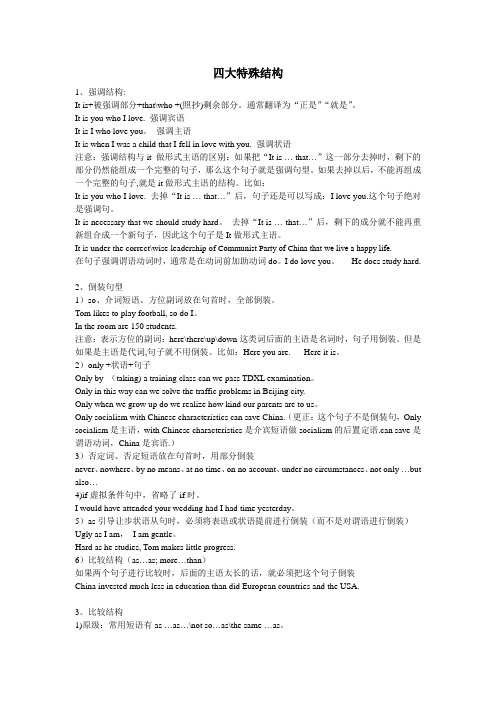
四大特殊结构1、强调结构:It is+被强调部分+that\who +(照抄)剩余部分。
通常翻译为“正是”“就是”。
It is you who I love. 强调宾语It is I who love you。
强调主语It is when I was a child that I fell in love with you. 强调状语注意:强调结构与it 做形式主语的区别:如果把“It is … that…”这一部分去掉时,剩下的部分仍然能组成一个完整的句子,那么这个句子就是强调句型。
如果去掉以后,不能再组成一个完整的句子,就是it做形式主语的结构。
比如:It is you who I love. 去掉“It is … that…”后,句子还是可以写成:I love you.这个句子绝对是强调句。
It is necessary that we should study hard。
去掉“It is … that…”后,剩下的成分就不能再重新组合成一个新句子,因此这个句子是It做形式主语。
It is under the correct\wise leadership of Communist Party of China that we live a happy life.在句子强调谓语动词时,通常是在动词前加助动词do。
I do love you。
He does study hard.2、倒装句型1)so、介词短语、方位副词放在句首时,全部倒装。
Tom likes to play football, so do I。
In the room are 150 students.注意:表示方位的副词:here\there\up\down这类词后面的主语是名词时,句子用倒装。
但是如果是主语是代词,句子就不用倒装。
比如:Here you are. Here it is。
2)only +状语+句子Only by (taking) a training class can we pass TDXL examination。
英语作文特殊结构句型

英语作文特殊结构句型Certainly, I can help you with that. Here's a sample essay on special sentence structures in English writing:---。
English Essay: Special Sentence Structures。
English, with its rich vocabulary and diverse grammar rules, offers a variety of special sentence structures that can add depth, clarity, and style to your writing. In this essay, we will explore some of these unique sentence constructions and how they can be effectively used in different contexts.1. Parallel Structure:Parallel structure involves using the same grammatical form for similar ideas within a sentence or paragraph. For example:"She likes hiking, swimming, and cycling." 。
"He not only enjoys reading novels but also writes poetry."Parallel structure helps in creating rhythm and balance in sentences, making them easier to read and understand.2. Inversion:Inversion involves reversing the usual order of words in a sentence to create emphasis or convey a specific meaning. For example:"Rarely have I seen such a beautiful sunset.""Not only was he late, but he also forgot his homework."Inversion is commonly used in formal writing, literature, and to add emphasis to a particular point.3. Conditional Sentences:Conditional sentences express a condition and its result. There are four types: zero, first, second, and third conditionals. For example:Zero conditional: "If you heat ice, it melts."First conditional: "If it rains tomorrow, I will bring an umbrella."Second conditional: "If I were rich, I would travel the world."Third conditional: "If he had studied harder, he would have passed the exam."Conditional sentences are essential for expressing hypothetical situations and their potential outcomes.4. Relative Clauses:Relative clauses provide additional information about a noun in the main clause. They begin with relative pronouns like "who," "which," "that," etc. For example:"The book that I'm reading is very interesting.""The woman who lives next door is a doctor."Relative clauses help in adding detail and specificity to sentences, making them more informative and engaging.5. Emphatic Structure:Emphatic structure involves using words like "do," "does," "did," "is," "are," etc., to emphasize a particular point. For example:"I do love chocolate!""He does make a good point."Emphatic structure is useful for conveying strong feelings or beliefs.In conclusion, mastering these special sentence structures can greatly enhance your English writing skills. Whether you're aiming for clarity, emphasis, or style, incorporating these constructions into your writing repertoire will undoubtedly elevate the quality of your compositions.---。
英语六大特殊句式
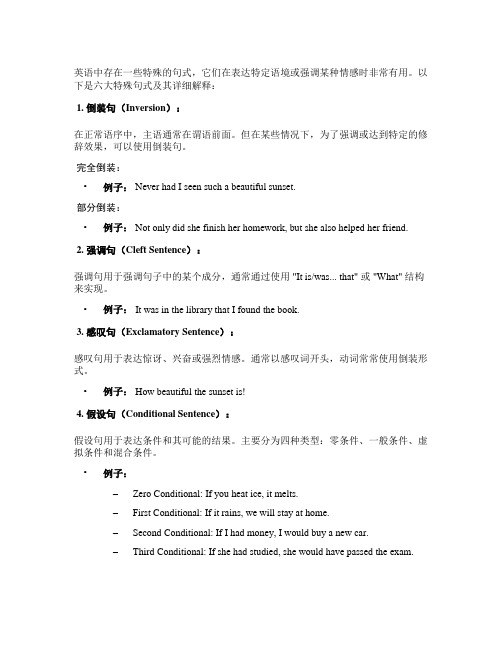
英语中存在一些特殊的句式,它们在表达特定语境或强调某种情感时非常有用。
以下是六大特殊句式及其详细解释:1. 倒装句(Inversion):在正常语序中,主语通常在谓语前面。
但在某些情况下,为了强调或达到特定的修辞效果,可以使用倒装句。
完全倒装:•例子: Never had I seen such a beautiful sunset.部分倒装:•例子: Not only did she finish her homework, but she also helped her friend.2. 强调句(Cleft Sentence):强调句用于强调句子中的某个成分,通常通过使用 "It is/was... that" 或 "What" 结构来实现。
•例子: It was in the library that I found the book.3. 感叹句(Exclamatory Sentence):感叹句用于表达惊讶、兴奋或强烈情感。
通常以感叹词开头,动词常常使用倒装形式。
•例子: How beautiful the sunset is!4. 假设句(Conditional Sentence):假设句用于表达条件和其可能的结果。
主要分为四种类型:零条件、一般条件、虚拟条件和混合条件。
•例子:–Zero Conditional: If you heat ice, it melts.–First Conditional: If it rains, we will stay at home.–Second Conditional: If I had money, I would buy a new car.–Third Conditional: If she had studied, she would have passed the exam.5. 比较句(Comparative Sentence):比较句用于比较两个或更多事物之间的差异。
高中英语语法之特殊句式的结构

特殊句式的结构(翻译,写作)1.There be 结构a. There is no sense in arguing with him on this problem.There is no point in repairing that old car again.a.There is no denying the fact.There is no telling what happened to him yesterday.There is no knowing when the newly built museum will be open.b.There is evidence that the time between each of the steps in this cycle has beenshortened.There are other indications that high school cheating may be on the rise.There is no doubt that he’ll come.d. There is no need to tell him everything.e.There remains nothing more to be done.There stands the Monument to the People’s Heroes at the center of the Tian’anmen Square.There exist different opinions on this question.f.There were many children who lost the chance to get education in this poor village in thelast two years.There are other techniques that might help you with your studying.2.It 结构a.It is adj …to do…It is easy for us to fall into bad habits but very difficult to break away from them.It is advisable to place important telephone numbers next to the phone in case of an emergency.It is possible for you to enter a key university.b.It is adj…. that….It is essential that the increase in production should meet the public demand.It is necessary that young and old people should communicate more with each other.It is certain that fresh air and exercises are more valuable than medicine.c.It is Ved/ has been Ved/ can be Ved/…that…It is now thought that the more work we give our brains, the more work they are able to do.It has been observed that unemployment brings enormous psychological troubles.It is reported that the electronic industry has developed rapidly in recent years.= The electronic industry is reported to have developed rapidly in recent years.可以使用这种结构的动词还有( say, expect, think, believe, imagine, suppose, assume, estimate…)It is said that he is the richest man in the world.= He is said to be the richest man in the worldIt is thought that he stole the purse.He is thought to have stolen the purse.d.It is no use/ good/sense doing…It is no good talking with such an ignorant person.It is no sense doing the experiment again.3.but 的用法a.anything but…一点儿也不Along in a deserted house, he was so busy with his research work that he felt anything but lonely.She was anything but mad.b.nothing but…仅仅,只She heard nothing but the wind.I did nothing but read a novel yesterday.c. but for….除非,要不是But for your help, I wouldn’t have succeed.But for the heavy rain, I would have arrived in time.d. can’t help but do (can’t help doing…) 禁不住…We cannot help but admit that the Chinese people are a great people.I couldn’t help but laugh at him.( I couldn’t help laughing at him.)e. have no choice but to do 不得不She had no choice but to wait.I have no choice but to tell you the truth.f. not…but…不是…而是…I meant not he but you should pay attention to pronunciation.He failed not because he isn’t clever but he didn’t work hard.4.比较句型a.同等程度比较:as/so…as;George is as efficient a worker as Bob.= George is a worker as efficient as Bobno less/more + 原级+ than…(和…一样);The heart is no more intelligent than the stomach, for they areboth controlled by the brain.A is toB what/as X is YAir is to us as water is to fish.Reading is to the mind what exercise is to the body.b.不同程度比较:比较级+ than;not so/as…as..(不如…,没有…)c.The比较级…, the比较级…The older I get, the happier I am.The sooner you start, the more quickly you’ll finish.d.would rather do sth…than do sth…“与其说….宁可…..”= (would do sth…rather than do sth)I would rather beg in the street than get money in such a dishonest way.I would beg in the street rather than get money in such a dishonest way.e. prefer to do sth…rather than do sth “愿意做…而不愿意做…”I prefer to work rather than wander about.f. more A than B “与其说是B不如说是A”The boy is more kind than brave.5.倒装句型a.全部倒装In came the teacher.Down jumped the burglar from the tenth floor when he heard someone shouted at him.On the top of the hill stands a temple.Gone forever are the days when the Chinese people were oppressed.b.部分倒装Hardly had she gone out when a student came to visit her.No sooner had she gone out than a student came to visit her.Not until his health was lost did he know what it was worth.Not only did he make a promise, but he also kept it.Never have I met such a personSeldom are women trusted to do an efficient job.Only then did I take pity on her.Only in the evening did he feel lonely.Only when one loses health does one know its value.So loudly did he speak that even people in the next room could hear him.So busy is he that he has no time to stay with us.Many a time has he helped me with my spoken English.Often do they warn us not to play on the road.Child as he is, he is always thinking of others.Cold as it was, they went swimming.Heavily as it rained, we decided to go there.Try as he might, he could not pass the exam.Had I known what was going to happen, I would never have done such a thing.= If I had known what was going to happen,……….6.强调句型It is/was + 强调部分+ that/who……It was Bob that/who went to the theatre with Jane last Sunday.It was in the Shanghai Stadium that I first met the tennis player.It was only when I got his letter that I knew what had happened to him.It was not until Mother satisfied his needs that Joe went to bed.What was it that caused the forest fire?Where was it that he found the rare coin?When was it that you got a doctor’s degree?7.感叹句What terrible mistakes they made!How terrible their mistakes were!What a rain!How terrible!。
英语特殊疑问句句式结构

英语特殊疑问句句式结构特殊疑问句是用来询问特定信息的句子,通常以特殊疑问词开头,比如:what, where, when, how等。
以下是一些特殊疑问句的句式结构。
1. 询问事物的特征或属性:- What is the capital of France?- The capital of France is Paris.- 问:法国的首都是哪里?- 答:法国的首都是巴黎。
2. 询问事物的位置:- Where is the nearest hospital?- The nearest hospital is on Main Street.- 问:最近的医院在哪里?- 答:最近的医院在主街上。
3. 询问事物的时间:- When is the party?- The party is on Saturday at 8pm.- 问:聚会是什么时候?- 答:聚会是在星期六晚上8点。
4. 询问事物的原因:- Why are you late?- I'm late because of the traffic.- 问:你为什么迟到了?- 答:我迟到是因为交通堵塞。
5. 询问事物的方式或方法:- How do you make a cake?- You make a cake by mixing flour, eggs, and sugar. - 问:你怎么做蛋糕?- 答:你可以通过混合面粉、鸡蛋和糖来做蛋糕。
6. 询问事物的数量或程度:- How much does this shirt cost?- This shirt costs $20.- 问:这件衬衫多少钱?- 答:这件衬衫20美元。
7. 询问事物的归属:- Whose book is this?- This book is mine.- 问:这是谁的书?- 答:这是我的书。
总结:特殊疑问句是用来询问特定信息的句子,通过特殊疑问词开头,可以询问事物的特征、位置、时间、原因、方式、数量和归属等。
高中英语语法:特殊句式
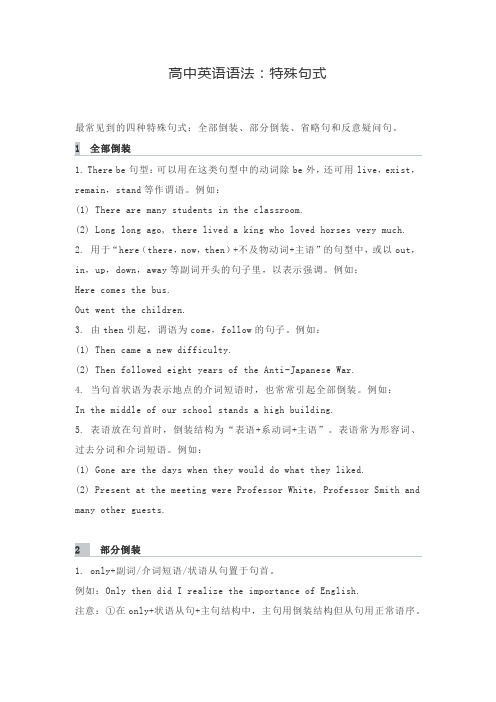
高中英语语法:特殊句式最常见到的四种特殊句式:全部倒装、部分倒装、省略句和反意疑问句。
1 全部倒装1. There be句型:可以用在这类句型中的动词除be外,还可用live,exist,remain,stand等作谓语。
例如:(1) There are many students in the classroom.(2) Long long ago, there lived a king who loved horses very much.2. 用于“here(there,now,then)+不及物动词+主语”的句型中,或以out,in,up,down,away等副词开头的句子里,以表示强调。
例如:Here comes the bus.Out went the children.3. 由then引起,谓语为come,follow的句子。
例如:(1) Then came a new difficulty.(2) Then followed eight years of the Anti-Japanese War.4. 当句首状语为表示地点的介词短语时,也常常引起全部倒装。
例如:In the middle of our school stands a high building.5. 表语放在句首时,倒装结构为“表语+系动词+主语”。
表语常为形容词、过去分词和介词短语。
例如:(1) Gone are the days when they would do what they liked.(2) Present at the meeting were Professor White, Professor Smith and many other guests.2 部分倒装1. only+副词/介词短语/状语从句置于句首。
例如:Only then did I realize the importance of English.注意:①在only+状语从句+主句结构中,主句用倒装结构但从句用正常语序。
英语常见特殊句结构及解析
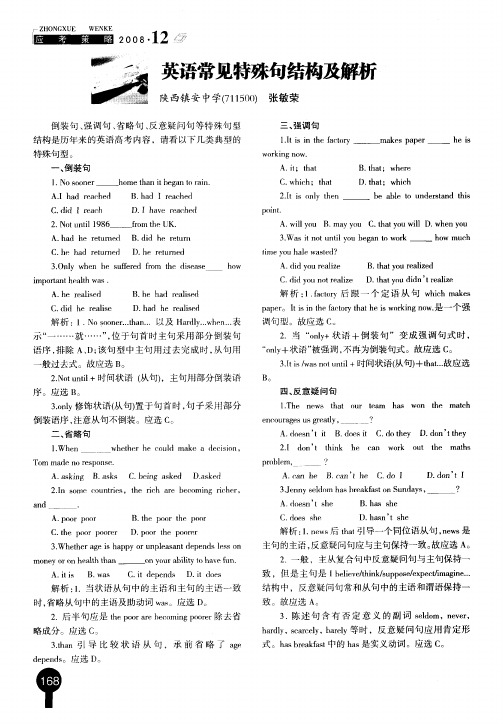
B.h t 0 a i d t a u r l e y z D. h t 0 in’ I ai ta u d d t l e v z
i 0t n e I a mp ra t at w s. h h
A. r aie he e ls d C. i h r aie d d e e ls B. h d aie he a I 1 d s D. d ha he ℃aj d r 1 s
p m£ 0 .
—
B. h t wh r ta : ee D.ha : whih t t c b bl t desa d 山 i e a e 0 un r tn s
1 N0s 0 r . o ne
A. h d Ta h d I a c e
C. i ra h dd I ℃ 2. t t1l 86 N0 i 9 un
四 、 意 疑 问 句 反
1 h n w t a 0 r e m h s . e e s h t u ta T a wo t e mac n h th
e c urg su r a1 n o a e sg e ty,
一 一
序 。应 选 B 。
3n ml y修饰状语 ( 句) 于句首 时 , 子采用部 分 从 置 句
3W a tn tI i y u be a 0wo k . si o l l 0 g n t r nt l瑚ey u h l se i 0 ae wa td?
h w 0
—
A. d he eum e B. d ha r t d di he eu n rt r C. h d eur e D.h eu e he a r t n d e rtm d
“
o 1+状 语 ” 强 调 , 再 为 倒装 句式 。故 应 选 C nv 被 不 。
英语级的几种特殊结构以及用法
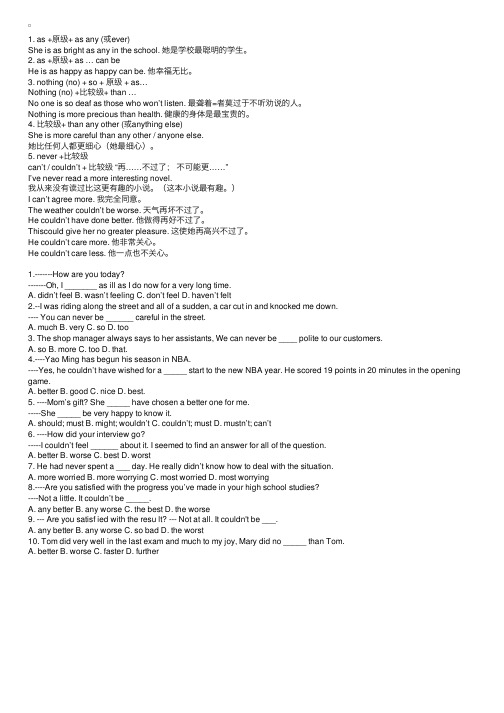
1. as +原级+ as any (或ever)She is as bright as any in the school. 她是学校最聪明的学⽣。
2. as +原级+ as … can beHe is as happy as happy can be. 他幸福⽆⽐。
3. nothing (no) + so + 原级 + as…Nothing (no) +⽐较级+ than …No one is so deaf as those who won’t listen. 最聋着=者莫过于不听劝说的⼈。
Nothing is more precious than health. 健康的⾝体是最宝贵的。
4. ⽐较级+ than any other (或anything else)She is more careful than any other / anyone else.她⽐任何⼈都更细⼼(她最细⼼)。
5. never +⽐较级can’t / couldn’t + ⽐较级 “再……不过了;不可能更……”I’ve never read a more interesting novel.我从来没有读过⽐这更有趣的⼩说。
(这本⼩说最有趣。
)I can’t agree more. 我完全同意。
The weather couldn’t be worse. 天⽓再坏不过了。
He couldn’t have done better. 他做得再好不过了。
Thiscould give her no greater pleasure. 这使她再⾼兴不过了。
He couldn’t care more. 他⾮常关⼼。
He couldn’t care less. 他⼀点也不关⼼。
1.-------How are you today?-------Oh, I _______ as ill as I do now for a very long time.A. didn’t feelB. wasn’t feelingC. don’t feelD. haven’t felt2.--I was riding along the street and all of a sudden, a car cut in and knocked me down.---- You can never be ______ careful in the street.A. muchB. veryC. soD. too3. The shop manager always says to her assistants, We can never be ____ polite to our customers.A. soB. moreC. tooD. that.4.----Yao Ming has begun his season in NBA.----Yes, he couldn’t have wished for a _____ start to the new NBA year. He scored 19 points in 20 minutes in the opening game.A. betterB. goodC. niceD. best.5. ----Mom’s gift? She _____ have chosen a better one for me.-----She _____ be very happy to know it.A. should; mustB. might; wouldn’tC. couldn’t; mustD. mustn’t; can’t6. ----How did your interview go?-----I couldn’t feel ______ about it. I seemed to find an answer for all of the question.A. betterB. worseC. bestD. worst7. He had never spent a ___ day. He really didn’t know how to deal with the situation.A. more worriedB. more worryingC. most worriedD. most worrying8.----Are you satisfied with the progress you’ve made in your high school studies?----Not a little. It couldn’t be _____.A. any betterB. any worseC. the bestD. the worse9. --- Are you satisf ied with the resu lt? --- Not at all. It couldn't be ___.A. any betterB. any worseC. so badD. the worst10. Tom did very well in the last exam and much to my joy, Mary did no _____ than Tom.A. betterB. worseC. fasterD. further。
高中英语知识点归纳名词性从句中的特殊结构和关系词
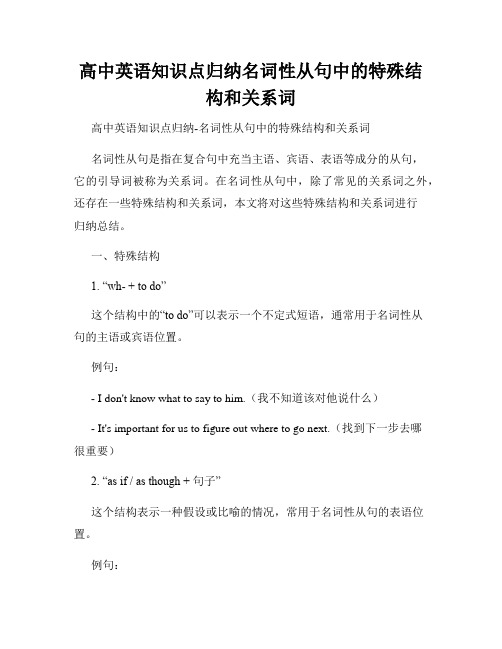
高中英语知识点归纳名词性从句中的特殊结构和关系词高中英语知识点归纳-名词性从句中的特殊结构和关系词名词性从句是指在复合句中充当主语、宾语、表语等成分的从句,它的引导词被称为关系词。
在名词性从句中,除了常见的关系词之外,还存在一些特殊结构和关系词,本文将对这些特殊结构和关系词进行归纳总结。
一、特殊结构1. “wh- + to do”这个结构中的“to do”可以表示一个不定式短语,通常用于名词性从句的主语或宾语位置。
例句:- I don't know what to say to him.(我不知道该对他说什么)- It's important for us to figure out where to go next.(找到下一步去哪很重要)2. “as if / as though + 句子”这个结构表示一种假设或比喻的情况,常用于名词性从句的表语位置。
例句:- She looks as if she were in a hurry.(她看起来好像很着急)- He acts as though he knows everything.(他行事好像什么都知道)3. “it + 不及物动词 + that从句”这个结构中的it充当形式主语,真正的主语是不及物动词,常用于名词性从句的表语位置。
例句:- It is strange that he didn't show up.(他没有出现很奇怪)二、关系词1. who / whom这两个关系词分别用于指代人,在从句中充当主语或宾语。
例句:- The girl who is sitting over there is my sister.(坐在那边的那个女孩是我妹妹)- I saw the man whom you were talking to.(我看见了你在和那个男人说话)2. which / that这两个关系词分别用于指代物,在从句中充当主语或宾语。
英语特殊句式语法

英语特殊句式语法英语语法中存在一些特殊的句式结构,它们具有独特的语法规则和用法。
在本文中,我们将介绍一些常见的英语特殊句式,并通过示例来解释它们的用法。
一、倒装句倒装句是英语中常见的特殊句式之一,它采取了主语和谓语动词的位置颠倒。
倒装句的用法多种多样,下面是一些常见的情况:1. 完全倒装:当句子以表示地点状态的副词(如here, there, now, then等)开头时,需要完全倒装。
例如:Here comes the bus.There goes my hat.2. 部分倒装:在某些特定的条件下,主语和谓语动词的位置需要部分颠倒。
a. 在用于表示否定的副词或短语(如never, seldom, hardly, not until 等)开头的句子中,需要将助动词或情态动词与主语颠倒。
例如:Never have I seen such a beautiful sunset.Not until she left did I realize how much I loved her.b. 在以表示条件的状语从句(如if, unless, whether等)开头的句子中,需将助动词和主语颠倒。
例如:If only I had more time, I would travel around the world.Whether it rains or not, we will go camping.二、虚拟语气虚拟语气是英语中常见的特殊句式之一,用于表示与事实相反、假设或愿望等情况。
以下是虚拟语气的几种常见形式:1. 虚拟条件句:用于表示与事实相反的假设情况,包括类型1、类型2和类型3三种类型。
a. 类型1:表示真实可能发生的假设例如:If she studies hard, she will pass the exam.b. 类型2:表示与事实相反,但在理论上有可能实现的假设例如:If I were you, I would quit that job.c. 类型3:表示与过去事实相反的假设例如:If I had studied harder, I would have passed the exam.2. 虚拟表达愿望例如:I wish I could play the piano like a professional.3. 虚拟表达建议、命令等例如:The teacher suggested that they should review the material again.三、强调句强调句是一种特殊的句式,它通过强调句子中的某个成分来表达特殊的意义。
英语八大特殊句式

英语八大特殊句式英语八大特殊句式一、主句+not…until…句型not…until…句型是一个倒装句,意思是“直到……才……”,not是部分否定,表示强调。
例句:I didn't go home until midnight.直到半夜我才回家。
二、It+be+形容词+that…句型此句型是强调句型,能形象准确表达出句子的意思,使句子语气更加强烈。
例句:It was amazing that he finished the work in such a short time.令人惊讶的是他竟然用如此短的时间就完成了这项工作。
三、not…until+从句句型not…until+从句句型表示内容得以实现的时间,或是强调情况发生的先后,通常译为“直到……才……”。
例句:I didn't know the news until he told me.直到他告诉我我才知道这个消息。
四、No…without+名词/代词句型No…without…句型表示肯定的含义,意思是“没有……就没有……”,常用在客观事实上。
例句:No success without hard work.没有努力就没有成功。
五、little+比较级/最高级+than句型此句型在主句中有肯定含义,常用在客观事实上,表示“……比……稍微……”。
例句:I'm a little younger than he is.我比他稍微年轻一点。
六、It+be+形容词+of+sb.+to do sth.句型此句型是结构严谨、表达精准的句型,将句子的客观内容与主观评价紧密连接在一起。
例句:It was very kind of you to help me.你帮助我真的很好。
七、it+be+宾语+that从句句型此句型可以表达出主句的肯定和客观,把主句和从句有机地结合在一起,而从句又可以表达句子的主观意见。
例句:It is important that we protect the environment.我们保护环境很重要。
- 1、下载文档前请自行甄别文档内容的完整性,平台不提供额外的编辑、内容补充、找答案等附加服务。
- 2、"仅部分预览"的文档,不可在线预览部分如存在完整性等问题,可反馈申请退款(可完整预览的文档不适用该条件!)。
- 3、如文档侵犯您的权益,请联系客服反馈,我们会尽快为您处理(人工客服工作时间:9:00-18:30)。
常见英语特殊结构1) not so much … as …The funding you have provided is not so much a material incentive as a moral support.你提供的资金与其说是一种物质刺激,倒不如说是一种道义上的支持。
The oceans do not so much divide the world as unite it.海洋与其说分割,不如说连接了整个世界。
The power of knowledge consists not so much in its wide spectrum as in its wide application.知识的力量与其说在于广博,不如说在于广泛应用。
2) not so much as 甚至不He cannot so much as spell a world like this.他连这样一个词都不会拼。
She cannot so much as read her own name.她连自己的名字也读不出来。
John passed right by my front door without so much as dropping in on me.约翰就在我家门前经过,都不进来看我。
3) if only…If only John were/was here now!If only I didn’t have to work for a living.4) there’s nothing like… 没有什么能比得上;以……为最There’s nothing like a long hot bath after a day’s climbing.爬了一天的山之后能够好好地洗个热水澡,再舒服不过了。
There’s nothing like education for breaking down class barriers.教育是消除阶级障碍的最有效手段。
5) there’s nothing to/in … 在……方面不费事There’s nothing to playing bridge so long as you work hard at it.只要肯下功夫,打桥牌并不难。
If you have shied away from making pancakes in the past, don’t be put off—there’s really nothing in/to it.你过去嫌难不想做烙饼吃,现在不用怕了—其实真的很容易。
6) be nothing to…The gift is nothing to what you have given to me.这件礼物远远比不上你送个我的东西。
What I have done is nothing to what you expect of me.我说做到与你所期望的相差甚远。
7) something of a …He was something of an essayist.他说得上是个散文家。
She is something of an expert on ethics.她对伦理学略有研究。
He is something of a gossip.他是个专门搬弄是非的家伙。
8) much of a …He was also a great deal of a politician.他是位出色的政治家。
He is not much of an artist.他算不上什么了不起的艺术家。
She’s not much of a tennis player.9) that fool of a John (of作“相似”理解)a giant of a man/ an angel of a wife/a mountain of a wave/ her brute of a husbandIt is as I have said a labyrinth of an old house.正如我所说,这是一幢迷宫似的老房子。
She was a fine figure of a woman and I could well believe that in youth she had been beautiful.她身材窈窕,优美动人,我确信她年轻时是个美人。
She is going to marry a perfect hog of a millionaire for the sake of her father, who is as poor as a church mouse.为了一贫如洗的父亲着想,她就要嫁给一个贪得无厌的百万富翁了。
10) t oo…to …A free trip to Paris—that’s too good an opportunity to miss.免费游巴黎—大好机会,不容错过!He’s too clever a politician to say a thing like that in public.他是个很精明的政客,才不会在公开场合说这些话哩!(若在too...to…前加only,意思不同)I’ll be only too happy to help you. 我很乐意帮助你。
I am only too delighted to accept your kind invitation.我实在很高兴接受您的友好邀请。
11) c annot…to …He claims that one cannot be too faithful to the original in translation.他说在翻译时,无论怎样忠实于原文都不为过。
There can never to too much deception in war. 兵不厌诈。
We can scarcely pay too high a price for liberty.为了争取自由,我们付出多大的代价都不为过。
12) m ore…than…He always seemed old to me, more like a grandfather than like a father.我总感到他很老,看上去更像是祖父而不是父亲。
He was more frightened than hurt. 他的伤倒不算什么,只是受惊不小。
So far heat pollution has been more a threat than a fact.迄今为止,热污染虽未成事实,却是一大潜在的威胁。
13) m ight as well… as 犹如/等于是One might as well throw money away as spend it betting.把钱拿来打赌,等于是把钱给白白扔掉。
You might as well expect the river to flow back as try to make him change his mind.你想让他改变主意,除非河水倒流。
14) a s well 不妨,最好还是I may as well admit that I knew the answer all along.我最好还是承认我是一直知道这个答案的。
Since you can’t win the race, you may/just as well quit.既然赢不了这场比赛,那倒不如退出为好。
15) r ather thanRather than waste/wasting your time doing it yourself, why don’t you call a builder?为什么你宁愿浪费时间自己做而不去请建筑工人呢?Rather than travel by air, I’d prefer to spend a week on a big liner.我宁可在远洋客轮上花一个星期也不愿乘飞机旅游。
16) o nly to 不料;反而;结果却Scott arrived at the South Pole on January 18th, only to find that Amundsen had got there before him.斯科特1月18日到达南极点,不料发现阿蒙森比他更找到达。
I arrive d at the shop only to find I’d left all money at home.我到了店里,结果却发现把钱留在家里了。
17) f or/with all… 虽然……;尽管……For all his great learning, he remains modest.他尽管很有学问,但仍然很谦虚。
With all his wealth and fame, he’s a very lonely man.他虽然有名有利,但很孤独。
For all their talk about peace, they have never taken any steps to reduce the tension.他们在那里奢谈和平,却从不采取措施来缓和紧张局势。
18) a s such 就以这种身份/资格;如所指的人或事物那样;确切地说;严格来讲There should be a law ensuring products tested on animals should be labeled as such.应该制定一条法规,确保在动物身上试验过的产品务必标明。
A professor, as such, deserves respect.像这样的一位教授值得尊敬。
The new job is not a promotion as such, but it brings good prospects for the future.这份新的工作严格来说算不上晋升,但很有发展前途。
Mere good looks, as such, won’t take you far.单是长得漂亮未必有前途。
Mr. Simon said he was not against taxes as such, “but do object when taxationis justified on spurious or dishonest grounds,” he said.西蒙先生说,他并不反对税收本身,“但我反对用不正当手段巧立名目课税。
”19) i f anything 要说有什么区别的话;甚至相反;甚至不如说(说话时意义的转折)It certainly wasn’t an improvement. We were, if anything, worse off than before.这肯定不是什么进步,正相反,我们比以前退步了。
